All-ceramic crowns are increasingly becoming the top choice in modern cosmetic dentistry solutions, optimally restoring teeth in terms of both shape and color. With advanced technology and premium ceramic lines, users can achieve bright, natural-looking teeth and maintain superior durability over time. To better understand the best types of dental crowns currently recommended by experts, My Auris Dental invites you to explore the details in the following content.
Which type of dental crown is best?
Are you wondering which type of dental crown is best? In reality, many people believe that all-ceramic crowns are better than metal-ceramic crowns; however, each type has its own advantages and disadvantages. Depending on the position of the crown, the cost of the crown, and your specific needs, you should carefully consider to choose the appropriate crown type, ensuring both aesthetic effectiveness and long-term durability.
Should you get all-ceramic crowns?
If you are looking for aesthetic and safe dental restorations, “should you get all-ceramic crowns” is a question worth considering. With quality all-ceramic crowns, you will achieve bright, uniformly colored teeth that meet aesthetic, durability, and safety criteria.
All-ceramic crowns are made entirely from solid ceramic, containing no metal, which helps prevent the black gum line discoloration. The beauty of all-ceramic crowns is superior due to their bright, harmonious color, light-reflecting ability similar to natural teeth, and outstanding natural shine. This type of crown is suitable for all positions, especially for teeth in the smile line, providing a natural look and long-lasting use.
Advantages of all-ceramic crowns
- All-ceramic crowns are the most beautiful and best dental crowns for aesthetics.
- Natural bright color, translucent and shiny like real teeth.
- Lifespan of up to 30 years or potentially permanent.
- Biocompatible with teeth and gums, safe and non-allergenic.
- Less tooth preparation required, keeping teeth strong and healthy.
- Lightweight, thin design provides comfort when worn.
Disadvantages of all-ceramic crowns
Despite numerous benefits, the cost of all-ceramic crowns is higher compared to other types. Therefore, you need to balance your finances before deciding.

Should you get metal-ceramic crowns?
Metal-ceramic crowns are a popular choice due to their lower cost, but they are more suitable for cases requiring high chewing force resistance rather than aesthetics.
Their structure consists of a metal alloy core covered with a ceramic layer, making them less prone to breakage and highly durable. There are three common types: American porcelain fused to metal crowns, titanium porcelain fused to metal crowns, and noble metal porcelain fused to metal crowns. This type is often recommended for molars, ensuring both chewing function and cost-effectiveness.
Advantages of metal-ceramic crowns
- Lowest cost among dental crowns.
- Good durability, lasting an average of 3-5 years.
- Ensures strong chewing function with relatively good force resistance.
Disadvantages of metal-ceramic crowns
- May cause gum line darkening after prolonged use.
- Not suitable for individuals with metal allergies.
- Requires a highly skilled dentist to ensure precise tooth preparation.
If you prioritize high aesthetics and long-term safety, choose quality all-ceramic crowns – the most beautiful and best dental crowns available today. Conversely, if you only need to improve chewing function and save costs, metal-ceramic crowns are a reasonable choice for molar positions.
How many types of dental crowns are there?
Dental crowning is currently a popular tooth restoration method that enhances smile aesthetics and corrects dental imperfections such as gaps, fractures, chips, or discoloration. So, how many types of dental crowns are there on the market today? What are the pros and cons of each type?
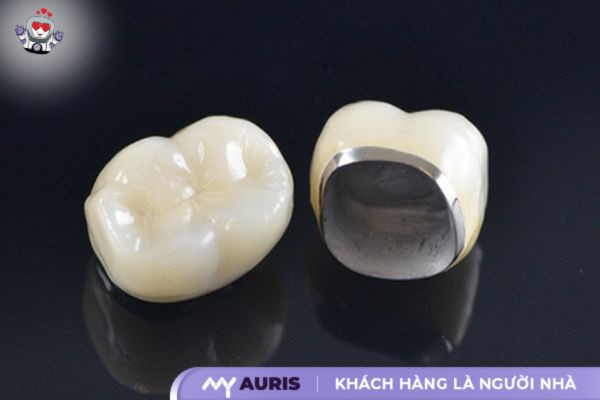
Metal-ceramic crowns
This is a traditional type of dental crown, with a framework made of Chrome-Cobalt or Chrome-Nickel alloy and a porcelain layer on the outside. Due to its good bite force resistance, this type of crown is considered suitable for many individuals.
Advantages
- It is the lowest-cost dental crown type currently available.
- Quite durable, lasting an average of 3-5 years.
- Ensures strong and stable chewing, with relatively good force resistance.
Disadvantages
- Opaque white color, not as translucent as natural teeth.
- Prone to gum line darkening after prolonged use due to the oxidation of the metal framework.
- Under light, the dark metallic core may be visible.
- May cause soft tissue irritation if the patient has incompatible body chemistry.
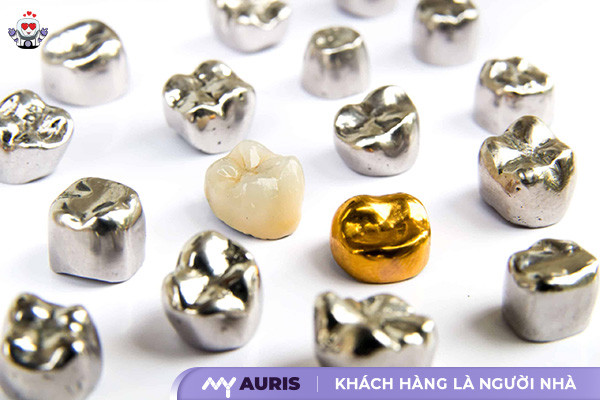
Noble metal-ceramic crowns
This type of crown has a structure similar to traditional metal-ceramic crowns, but the framework is made from precious metals such as gold, platinum, or palladium. This is a superior choice with exceptional durability.
Advantages
- Does not cause graying of the gum line like regular metal-ceramic crowns.
- Gold has antiseptic properties, helping to effectively prevent gum inflammation.
- High biocompatibility, rarely causes irritation.
Disadvantages
- High cost, potentially comparable to or exceeding all-ceramic crowns.
- Aesthetics and chewing function are not as optimal as all-ceramic crowns.
- Highly dependent on the market price of precious metals.

All-ceramic crowns
All-ceramic crowns are made entirely from high-grade ceramic material, containing no metal. The Cercon CAD/CAM line is particularly noteworthy – it utilizes advanced technology, designed and manufactured on a highly precise computer system.
Advantages
- Natural color, translucent and shiny like real teeth, does not change color over time.
- Does not cause gum line darkening, no visible metal framework.
- Long-lasting durability, usable for 10-20 years or more with good care.
- Does not cause soft tissue irritation, does not cause bad breath.
- Quick restoration, high aesthetics, minimal tooth preparation required.
Disadvantages:
- Highest cost among all types of dental crowns.
- Requires highly skilled dentists and modern equipment for execution.
- Complex and meticulous manufacturing process, requiring more time.
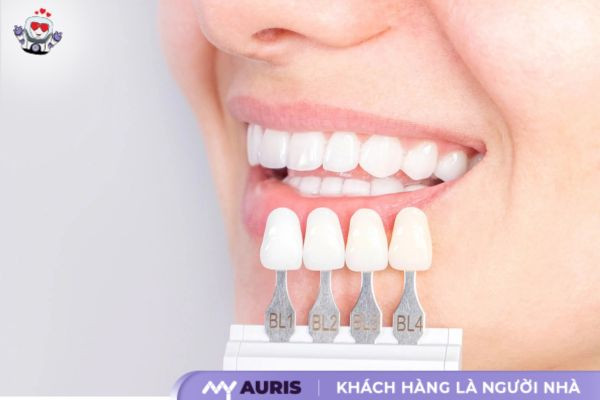
Porcelain Veneers
Porcelain veneers (Laminate veneers) are ultra-thin porcelain shells, directly bonded to the outer surface of teeth after minimal tooth enamel removal. This aesthetic restoration method is highly popular in the US and Europe, but it is not yet widespread in Vietnam due to high technical requirements.
Advantages:
- Maximally preserves tooth structure, requiring only a thin layer of enamel removal.
- Natural color, high aesthetics, difficult to distinguish from natural teeth.
Disadvantages:
- Lower durability than full crowns, can chip or debond if adhesive degrades or hard foods are bitten.
- Relatively high cost due to the demand for high skill and complex technology.
Summary of the best dental crowns available today in 2025
Dental crowning is a popular cosmetic dentistry method, chosen by many clients for its ability to improve chewing function and aesthetics. Currently, there are many types of dental crowns from various brands on the market. So, what is the best type of dental crown today? Let’s explore the top 9 recommended dental crowns by dentists with My Auris Dental, prominently featuring Nacera crowns – a premium all-ceramic crown product.
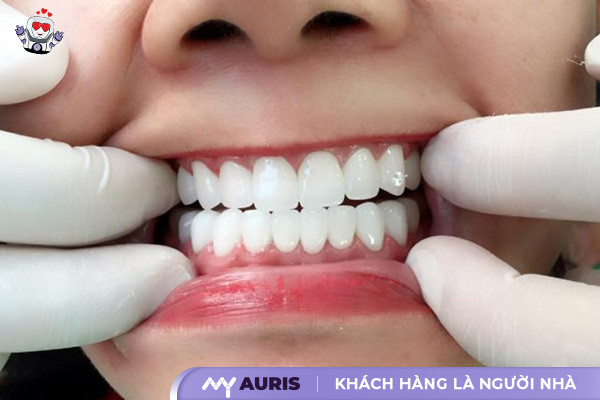
Nacera Dental Crowns
Nacera dental crowns are an excellent choice for clients seeking premium all-ceramic crowns. Produced by the German brand Doceram, these crowns use pure ceramic blanks, free from impurities, ensuring absolute purity. As a result, the crowns have high biocompatibility, are safe, and do not cause irritation to the oral cavity, even for sensitive individuals.
Outstanding Advantages
- High durability, with a fracture resistance exceeding 1400Mpa – many times greater than natural teeth.
- Manufactured with modern technology, producing beautiful, standard color, size, and shape – providing a natural feel.
- Natural translucency like real teeth, maximizing aesthetic appeal.
- High thermal insulation, effectively protecting the natural tooth stump and limiting oxidation from the oral environment.
- Long lifespan of 10-20 years with proper use and care.
Disadvantages to note
- As a product of a renowned brand, the price is higher than conventional dental crowns.
- Being a high-end all-ceramic crown, Nacera dental crowns are not yet widely available in Vietnam.
Cost of Nacera dental crowns: ranges from 9,000,000đ – 10,000,000đ per tooth, depending on specific cases.
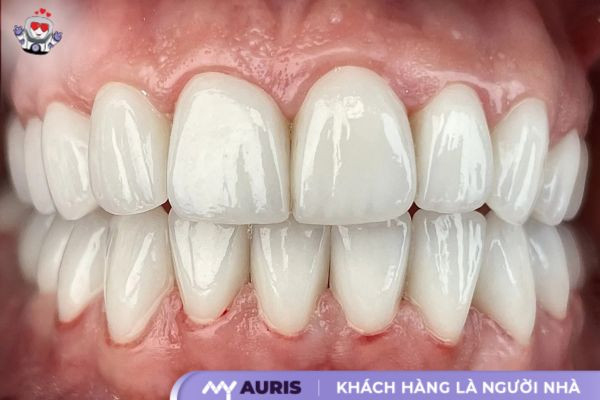
Zirconia Crowns
Zirconia crowns are a premium type of dental crown, made entirely from Zirconium Dioxide, a biocompatible material that does not cause irritation and is absolutely safe for oral health. Due to its superior properties, Zirconia crowns are often prescribed by dentists for cases of missing tooth restoration on implants, porcelain bridges, or single tooth crowns for patients.
Advantages
Manufactured using modern CAD/CAM technology: Zirconia crowns boast high aesthetic appeal, mimicking the shape, color, and size of natural teeth, providing a natural, refined smile.
Safe material, high biocompatibility: Zirconia is considered a material with good healing capabilities, causing no irritation to gum tissue, suitable even for individuals with sensitive body chemistry.
Long-lasting durability: With proper use and care, Zirconia crowns can maintain their durability for 10-20 years, helping to save long-term costs and ensuring effective use.
Disadvantages
The only drawback of Zirconia crowns is their relatively high cost. However, with superior quality, durability, and aesthetic appeal, they are still considered one of the best dental crown types available today, recommended by many dentists for cases requiring precision and longevity in tooth restoration.
The cost for each Zirconia crown ranges from 5,000,000đ – 10,000,000đ per tooth, depending on the actual tooth condition and the policy of each dental clinic.

Cercon Crowns
Cercon crowns are premium all-ceramic crowns originating from Switzerland, known for their modern CAD/CAM manufacturing technology, ensuring almost absolute precision and a natural, refined appearance. The structure of this crown type consists of two layers: a sturdy Zirconia core and an outer Cercon Kiss porcelain coating, providing a tooth-like color, good thermal insulation, and impressive durability.
Advantages
- High aesthetic appeal with natural shades that do not change color under light or over time.
- Optimal fit thanks to CAD/CAM technology, ensuring the crown is not uneven, bulky, or warped, providing comfort during use.
- Zirconia and Cercon Kiss components ensure no oxidation in the oral cavity, making them safe and biocompatible for oral health.
- Superior fracture resistance of up to 900Mpa, 5 times stronger than natural teeth, minimizing the risk of chipping or breaking during chewing.
- Average lifespan of 10-15 years, or even longer with proper care.
Disadvantages
- Due to its high translucency, Cercon crowns may struggle to mask severely stained tooth stumps, especially in cases of antibiotic-induced discoloration.
- High cost is a barrier that makes many clients hesitant when choosing this type of porcelain.
Reference price: 5,000,000đ – 6,000,000đ/tooth
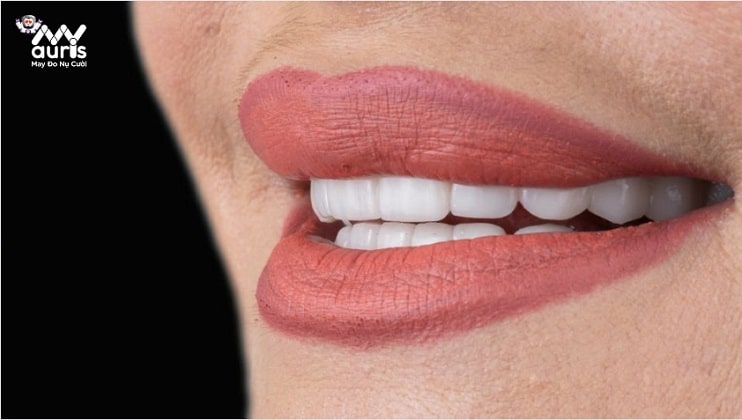
DDBIO Crowns
DDBIO crowns are one of the premium all-ceramic crown lines manufactured from pure Zirconia imported from Germany. With a two-layer structure consisting of an inner core and an outer ceramic layer, this product effectively restores tooth shape and improves chewing ability, while maintaining aesthetic appeal.
Advantages
- High biocompatibility, minimizing the risk of rejection or allergy in the oral environment.
- Made from 100% solid ceramic, ensuring safety and no irritation to gums or tooth enamel.
- Two-layer design helps reduce sensitivity, protecting the tooth stump and gums from external impacts.
- Thanks to CAD/CAM technology, the crowns have high precision and natural color, matching real teeth.
- Fracture resistance 10 times stronger than natural teeth, reducing chipping or breakage during use.
- High durability, can be used for 10-15 years with proper care.
Limitations
- Not yet widely used, currently only available at some major dental clinics in Vietnam like My Auris Dental.
Reference price: 3,000,000đ – 4,000,000đ/tooth

Zolid Crowns
Zolid crowns are considered one of the best dental crown types currently available, noted for being made 100% from solid Zirconia – a modern material that offers high quality and superior aesthetics. This is an ideal choice for cases of chipped teeth, cavities, gaps, underbites, discoloration due to Fluoride, or severe antibiotic staining.
Outstanding Advantages
- Natural color, beautiful shine, even coloration, does not become opaque during use, giving a feeling like real teeth.
- Made entirely from porcelain, allowing the teeth to have high stain resistance, without changing color or deteriorating over time.
- High fracture resistance of 1400 Mpa, 5 times stronger than natural teeth, supporting comfortable chewing, reducing chipping and breakage during long-term use.
- Due to high biocompatibility, Zolid crowns ensure safety and are gentle on the oral cavity, causing no irritation or side effects.
- Long lifespan of 10-20 years, or even longer with proper care as advised by the dentist.
Disadvantages
- High cost is the biggest disadvantage, making many people hesitant.
- Due to its expensive nature, Zolid crowns are not very common and are typically only offered at large, reputable dental clinics.
- The cost of Zolid crowns ranges from 7,500,000đ – 8,000,000đ per tooth, depending on the treatment location and applied technology.
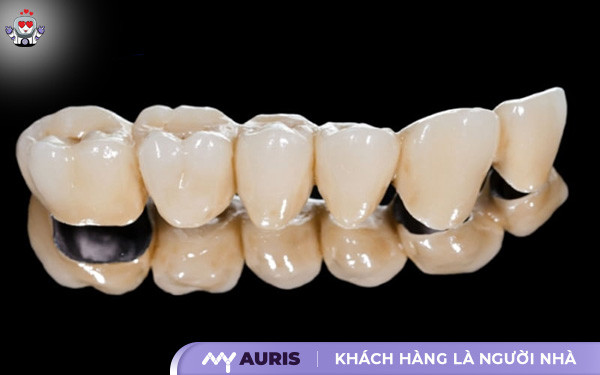
Titanium Porcelain Crowns
Titanium porcelain crowns are a long-standing type of metal-ceramic crown, still widely used due to their stability and reasonable price. The product has a two-part structure consisting of an outer Ceramco III porcelain layer and an inner metal core made of Nickel, Chromium, and Titanium alloy.
Outstanding Advantages
- With Titanium content, this type of crown has higher biocompatibility than regular metal-ceramic, reducing the risk of gum tissue irritation.
- High fracture resistance, 3-4 times stronger than natural teeth, allowing users to chew comfortably without worrying about chipping or breaking.
- The thin outer porcelain layer enhances aesthetic appeal, creating a color more similar to natural teeth than regular metal-ceramic.
- More biocompatible than other metal-ceramic types, suitable for individuals with sensitive body chemistry.
- Low thermal conductivity, helping to reduce sensitivity and discomfort when consuming hot/cold foods.
- Reasonable price, suitable for the budget of many people, especially those who need multiple teeth restored at once.
Disadvantages
- The color is only relatively natural, not achieving the same degree of naturalness as all-ceramic crowns.
- Due to the metallic material, the crown may darken or oxidize after long-term use.
- Cannot be used for front teeth or incisors because the aesthetic factor does not meet standards.
- The price of Titanium porcelain crowns ranges from 2,000,000đ – 3,000,000đ per tooth – an optimal cost for those with a limited budget.
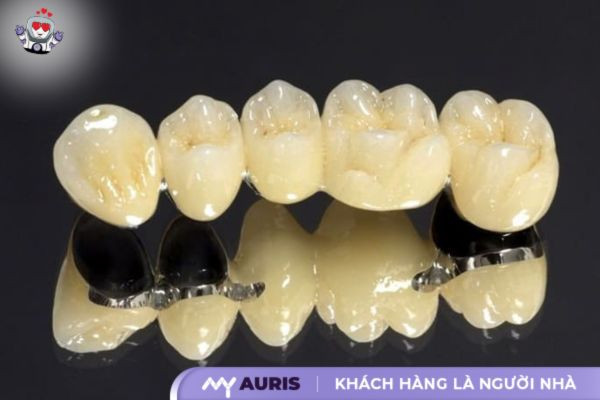
Chromium-Cobalt (Co-Cr) Porcelain Crowns
Chromium-Cobalt (Co-Cr) porcelain crowns are renowned metal-ceramic products from Germany, highly regarded for their safety and lasting quality. With Chromium and Cobalt as main components, this type of porcelain is particularly suitable for individuals with sensitive body chemistry or metal allergies.
Advantages
- Good aesthetic appeal thanks to the outer porcelain layer that closely matches natural teeth.
- Nickel-free, ensuring absolute safety for long-term use.
- Sturdy metal framework, enhancing durability and reducing chipping during chewing.
- High biocompatibility, causing no inflammation or oxidation in the oral cavity.
- Affordable price, accessible to the majority of users with average incomes.
Disadvantages
- Aesthetics are not truly perfect, making them unsuitable for restoring front teeth.
- The dark Chromium core can cause gum line discoloration (black or yellowish tint) after prolonged use.
Reference price: From 1,200,000 – 1,500,000đ/tooth.
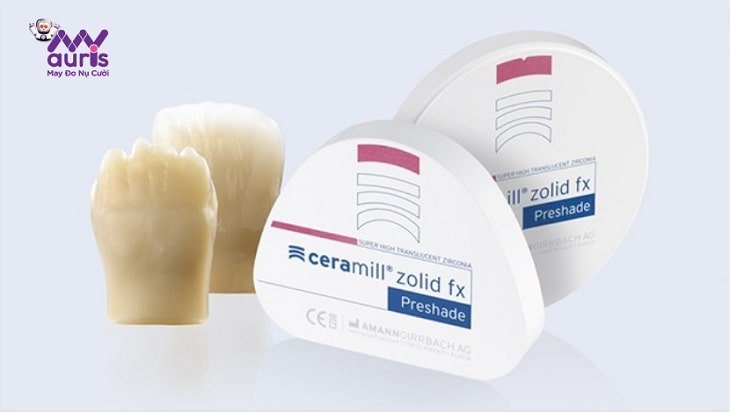
Ceramill Crowns
Ceramill is a premium all-ceramic crown line from Germany, manufactured using CAD/CAM 3D technology, offering maximum precision and a bright, natural appearance like real teeth. The main material is Zirconia combined with a Ceramill Kiss enamel layer, creating a very natural light reflection and translucency.
Advantages
- Superior aesthetics thanks to multi-layered ceramic design, recreating the translucency, opacity, and light reflection of natural teeth.
- Available in 16 shades, suitable for various tooth enamel types and skin tones.
- Fracture resistance of up to 1100 Mpa, 5 times stronger than natural teeth, supporting strong chewing without sensitivity.
- CAD/CAM technology provides high precision, optimizing occlusion and function.
- Thin and lightweight design; in many cases, tooth preparation is minimal.
- Lifespan of up to 15 years with proper care.
Disadvantages
- High cost, suitable for those who desire superior quality and aesthetics.
- Requires highly skilled dentists to perform the correct technique.
Reference price: From 7,500,000 – 8,000,000đ/tooth.
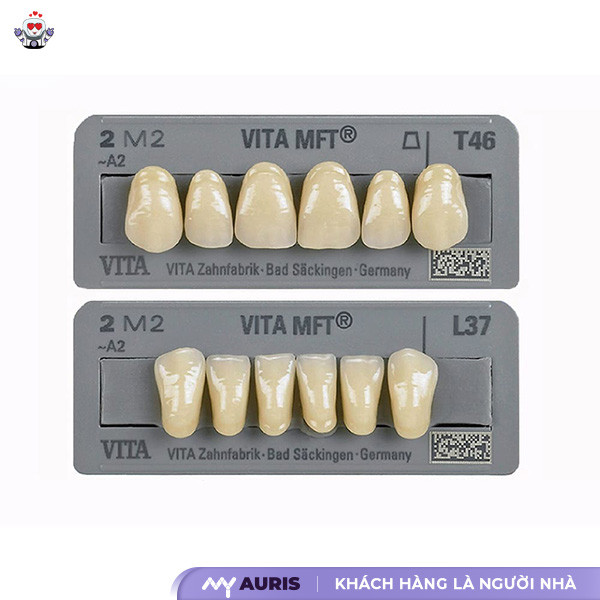
Vita Crowns
Vita crowns from Germany belong to the premium all-ceramic line with pure VKM material, unadulterated and metal-free. This is a popular choice for restoring cases such as gapped teeth, decayed teeth, pulp inflammation, or as crowns on Implant abutments.
Advantages
- Natural white and shiny porcelain layer, providing a translucent beauty like real teeth.
- Made entirely of porcelain, it causes no irritation or gum inflammation over long periods.
- High fracture resistance, 5 times stronger than natural teeth, allowing comfortable chewing without sensitivity.
- High biocompatibility, limiting oxidation in the oral cavity.
- Reasonable cost, an optimal choice balancing quality and economy.
Disadvantages
- Due to its affordable price, the aesthetic features or light reflection may not compare to high-end lines like Ceramill.
Reference price: From 3,000,000 – 5,000,000đ/tooth.





